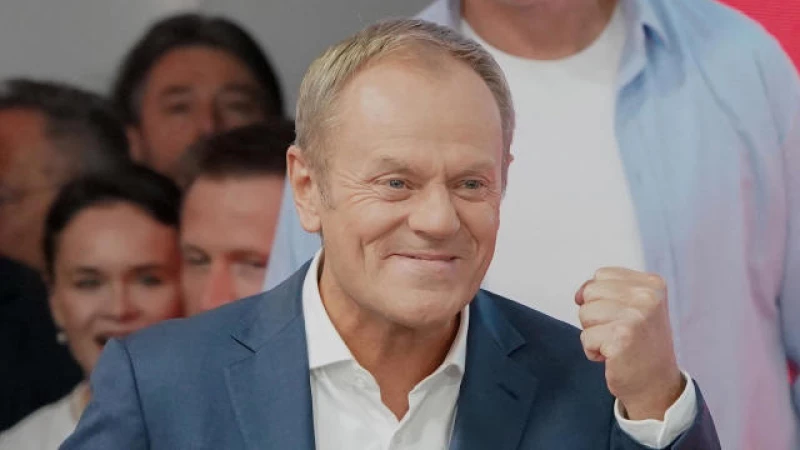Berlin - Poland has a new prime minister
Poland has a new prime minister, and with his clearly pro-European Union, pro-NATO stance, Donald Tusk marks a stark change from the country's outgoing, right-wing nationalist Prime Minister Mateusz Morawiecki.
With his election victory, Tusk, a 66-year-old former European Commission president, has also become a new bearer of hope for European progressives and centrists at a time when many nations on the continent are showing increasing affinity for far right-wing populism.
- Far-right lawmaker douses menorah candles in Poland's parliament
Political analyst Wojciech Przybylski, who heads the Visegrad Insight think tank, told CBS News that Tusk's election was "a moment of empowerment and excitement" for Poland.
"It woke up the silent majority that oftentimes allows for slipping into autocracy by being silent," Przybylski said, attributing Tusk's win to the politician's "leadership and stubborn, direct campaigning and coordination with other leaders. That's a way to win, and rule."
Tusk wants to improve his country's relations with the EU, and addressing lawmakers Tuesday ahead of his swearing in, he said anyone who questions Poland's place in the bloc was damaging its interests.
Tusk stated that Poland, a long-time supporter of Ukraine during Russia's invasion in February 2022, will remain a strong member of NATO and a reliable ally of the United States. He emphasized the importance of Poland's position among its European neighbors and warned against isolation, highlighting the increased geopolitical risks it would face.
Below, we examine recent political shifts in Europe that indicate Poland's departure from its nationalist past, particularly with Tusk's election.
The Netherlands and Geert Wilders
The Netherlands serves as a recent example of the rightward shift in Europe. In November's parliamentary elections, the right-wing, anti-Islam populist Geert Wilders' party emerged as the clear winner.
Migration and asylum emerged as decisive factors in the election. Wilders, who had long been a marginal figure in Dutch politics, gained prominence through his strong anti-Islam rhetoric, which includes plans to ban mosques, Islamic schools, and the Quran nationwide. With the support he garnered, Wilders is now in a position to form a coalition government with other parties.
Since his party's victory, Wilders has pledged to govern for the benefit of all Netherlanders.
In September 2022, Italians voted in the country's most right-wing government since World War II. Prime Minister Giorgia Meloni, leader of the Brothers of Italy party, is the country's first female leader.
Meloni heads a coalition government with two equally far-right parties and frames herself as a family-focused Christian battling a left-wing ruling elite, and often points at migration as the root of many socioeconomic challenges facing Italy.
Not leaders, yet, but tail winds for the far right
In Switzerland, the right-wing populist Swiss People's Party was the clear winner in October's national elections. Switzerland is led by a seven-member Federal Council, the members of which are elected by the Parliament. In the October elections, the People's Party bounced back from losing seats four years earlier to enhance its position as the biggest party, by seats held, in the Parliament.
In Germany, the right-wing nationalist Alternative for Germany (AfD) party is riding high in the polls, currently trailing only former Chancellor Angela Merkel's center-right Christian Democratic Union party (CDU).
Germany's national Office for the Protection of the Constitution has classified the AfD as a suspected right-wing extremist organization, after various members made remarks deemed unconstitutional, including antisemitic comments and calls for violence against the current government.
The AfD's increasing vote share, however, has forced a lively debate within parties like the CDU over how willing they should be to enter future coalitions with the far right.
In April 2022, French President Emmanuel Macron decisively won a second term, beating his far-right-wing opponent Marine Le Pen.
But the ability of Le Pen's National Rally party to capture 40% of the vote was a wake-up call for French liberals and centrists that her anti-EU, anti-NATO views have gained traction as the continent struggles to emerge from the economic pain of the coronavirus pandemic amid a spiraling immigration crisis.
Austria's Right-Wing Freedom Party Leading in Polls Ahead of Next Year's Election
In Austria, where a new Parliament will be elected next year, the right-wing Freedom Party (FPÖ) is currently leading in the polls. This populist and anti-EU party has been a part of various Austrian governments over the past 25 years, but has yet to secure enough seats to take the lead.







